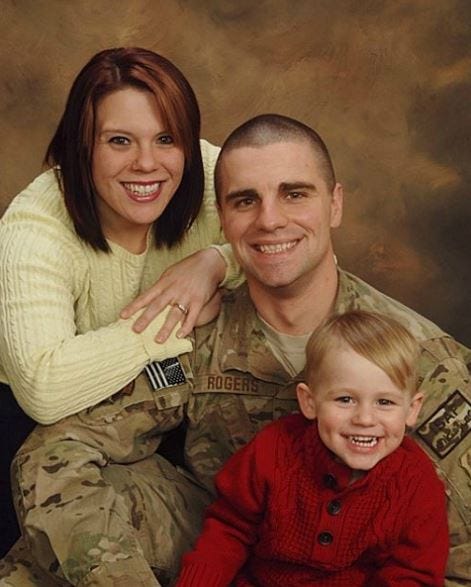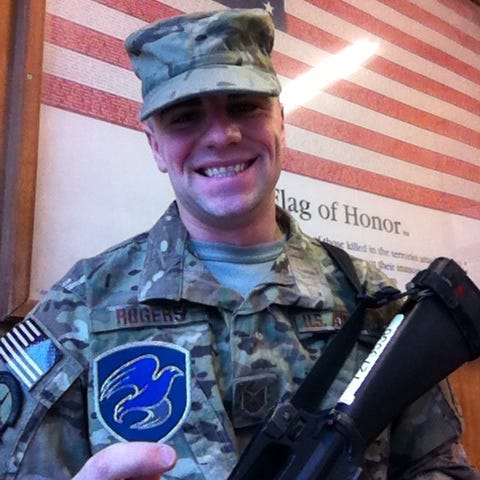By David Rogers
It was just two days before I was deploying to Afghanistan and I had refused offers for a going away party. I didn’t feel like I had deserved to celebrate yet. I knew that I had a long road ahead of me. Instead, I quietly visited with my family and close friends.
When the talk inevitably transitioned from small talk to a discussion of my impending seven months at war, our friends asked me the question that I’ll never forget.
“So, are you worried about coming home…different?”
Although the question was blunt, I was grateful that they asked. Many of my loved ones had no doubt wondered the same thing. In retrospect, the question should have made me uncomfortable, but it didn’t. I had thought the same question to myself many times.
“I will come back from this deployment different,” I told them. I have seen the challenges firsthand that veterans of my era have faced, both through our service and leaving the military to start a new life. We have made many sacrifices in our service. We have put our mission first. Our families, our safety, and our personal needs were often secondary.
Through my service in the Air Force Reserve and my role at The Mission Continues, I know veterans who have returned with missing limbs, lifelong ailments and post-traumatic stress disorder — the things most folks think about when they consider veterans transformed by combat.
But not all of us will return with injuries, either visible or invisible. Yet each of us has faced constant adversity after more than a decade at war. We are different because of it.
I faced plenty of challenges during my seven-month deployment to Afghanistan. As a munitions technician, I assembled the explosives used by aircraft to fly combat missions across Afghanistan. We worked long hours through cold nights.
Incoming enemy rockets were a constant threat.
Building 500 lb. bombs in Afghanistan. Hundreds would drop from aircraft during David’s tour.
More than 80 of these rockets were fired at us during our time there. They landed with little warning and on numerous occasions, exploded all around me. It was impossible to not think about the possibility of being hurt or killed by these enemy rockets.
Though those difficult times, not knowing if any one day would be my last, I vowed to live each day to its fullest. I always tried to treat my team as though each conversation may be the last. I tried to inspire and make others laugh. I told my wife that I loved her every time we had the chance to talk. I wrote many letters to my two-year old son that detailed these experiences and aimed to teach him the important life lessons that I had learned, so that he can have a better life.
David’s return home.
As my redeployment date got closer, I wondered how I could ever transition back to a life of safety and security. I worried that any loud noise at home would put my mind right back into Afghanistan while my body was home safe.
This is no doubt how my friends worried I would come home different.
Now that I’ve been home for a couple months, I have very different emotions than what I originally feared. Loud noises do nothing more than heighten my senses for a moment. It took some time, but I feel more comfortable in larger crowds. And most importantly, I have shared these stories with loved ones — and they have been supportive and caring.
I also remind myself that these experiences are mine alone and do not reflect those of all veterans.
Veterans have returned to face very real physical and psychological barriers to reintegrating to life as a civilian. Yet I can now see one common factor that does exist in all veterans experiences at war and at home: the development of resilience in the face of adversity.
It is easy to believe that surviving traumatic experiences makes us weaker. However, after witnessing the resilience of veterans for many years in the Air Force and at The Mission Continues, I believe the reverse is true most often.
We are a generation of veterans who are now stronger. We are returning to a country that is increasingly seeing our military service as an asset for our roles here at home.
Veterans are transitioning from commanding aircraft carriers to building houses for the homeless, from repairing fighter jets to running community gardens. These veterans are continuing their service to their country by volunteering across the country through The Mission Continues Fellowshipand Service Platoon Programs.
In just a few short years, veterans serving with The Mission Continues Fellowship Program have contributed more than a half million hours of volunteer service to more than 600 nonprofit organizations. Their volunteer service has defined a generation of veterans that are better equipped to tackle pressing issues at home.
Through The Mission Continues Service Platoons, we are now empowering both veterans to make a difference in their communities across America. These men and women are becoming stronger leaders as they work to eradicate homelessness, reduce food insecurity, restore the environment and promote youth development.
As a generation of veterans that have served our country in the years since 9/11, we have continued to overcome obstacles in our transition out of the military, yet we are committed to continuing to have a positive impact on the lives of those around us.
Now that I have returned home from seven months at war, I know that I will face more challenges in my transition. However, I now have a new mission and I have many veterans beside me who are also committed to strengthening our own lives as we work together to strengthen the lives of others. Together we will channel our passion, commitment and leadership so that our shared legacy as a generation of veterans will be one of action and service.
I did come back from the deployment different. I came back stronger. And my mission will continue.
David Rogers is the Fellowship Program Director at The Mission Continues and currently serves in the Air Force Reserve. David returned this fall from a seven month deployment to Bagram Airfield, Afghanistan where he maintained explosive assets as a Munitions Systems Technician.


No comments:
Post a Comment